Dealing with Car Overheating Issues: Quick Fixes and Prevention Tips
Encountering an overheating car while enjoying a drive is something we all dread. Overheating not only disrupts a pleasant journey but can also hint at deeper mechanical issues. Fortunately, with a good grasp of overheating causes, we can often prevent or swiftly address this problem when it arises.
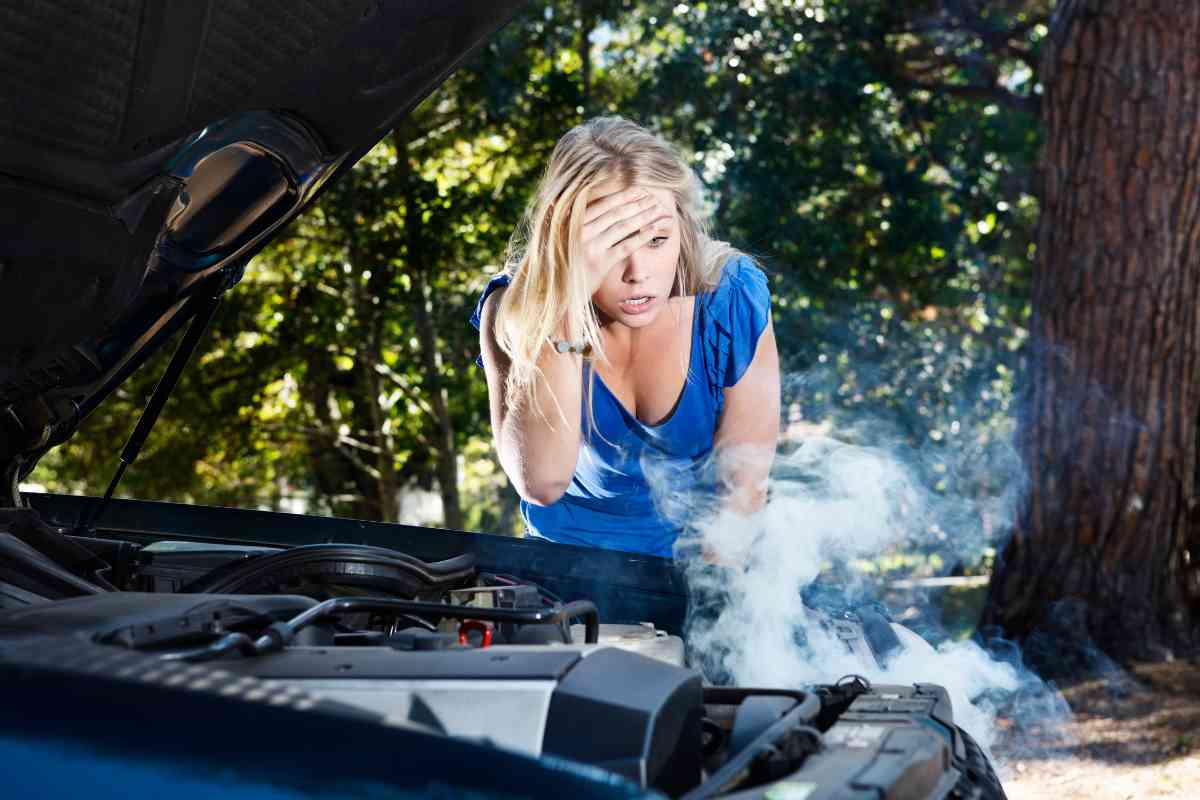
Related Post! Can A Car Explode If It Overheats?
How Do I Deal With Car Overheating Issues?
To address car overheating issues, start by turning off the air conditioning and turning on the heater to reduce engine load and draw heat away. Safely pull over, turn off the engine, and wait for it to cool before checking coolant levels. Avoid opening the radiator cap while hot to prevent burns. Regular maintenance, including checking coolant levels and ensuring the cooling system is leak-free, can prevent future overheating. If the problem persists, consult a professional for a thorough inspection and repair.
A common cause of overheating is a leak in the cooling system, allowing coolant to escape from hoses, the radiator, or connections, thus reducing the coolant level below what’s needed for effective engine cooling. Another frequent issue is a faulty thermostat, which can impede coolant flow, leading to engine heat build-up. These examples are among many potential reasons for overheating, including a broken water pump or a clogged radiator.
Knowing the correct steps to take if your car starts to overheat is essential. You should immediately turn off the air conditioning to reduce engine stress and turn on the heater to help draw heat away from the engine. If possible, safely pull over and turn off the engine to let it cool down, as this can prevent further damage and costly repairs.
Understanding Car Overheating
Navigating through an overheating issue is less daunting when you’re familiar with its causes and can recognize early warning signs, helping to avoid a breakdown.
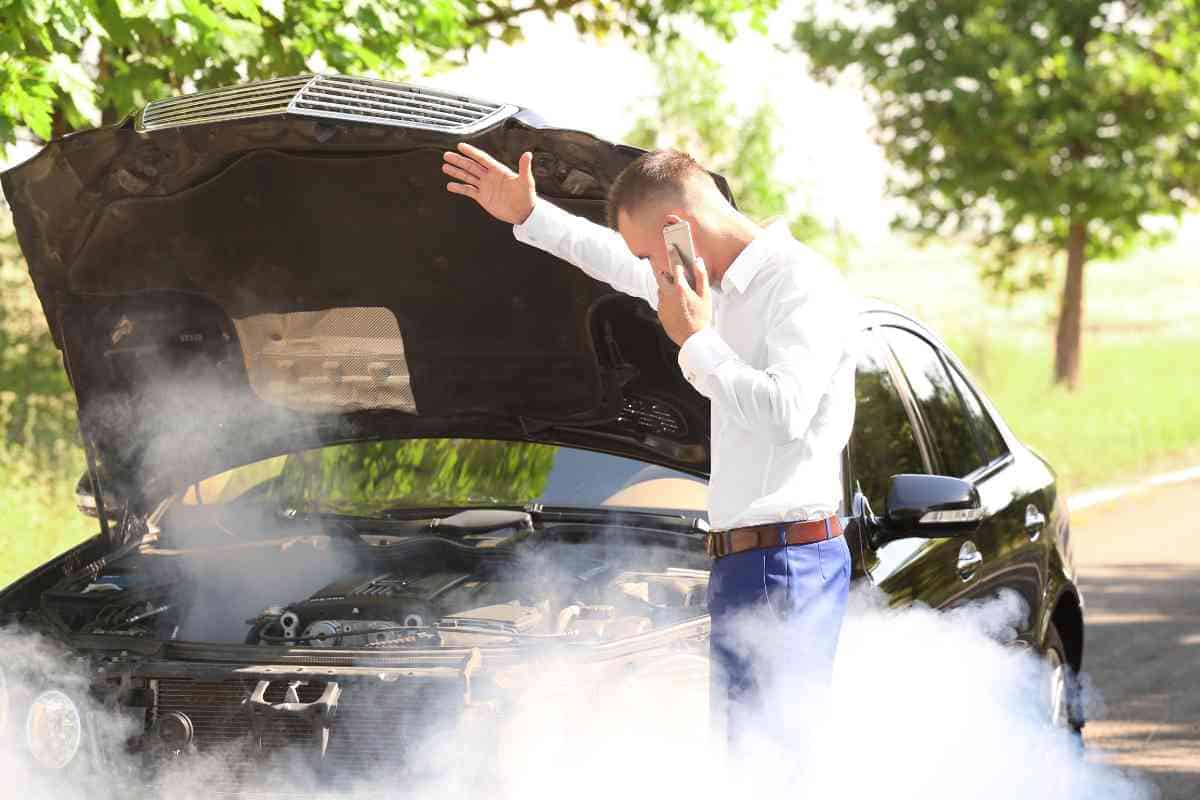
Causes of Overheating
Typical reasons for a car to overheat include:
- Low Coolant Levels: Insufficient coolant hampers effective heat transfer away from the engine.
- Malfunctioning Thermostat: An unopened thermostat blocks coolant flow to the engine.
- Failed Water Pump: Essential for coolant circulation, its failure results in overheating.
- Leaky Cooling System: Loss of coolant from leaks in hoses, radiators, or the head gasket can spike temperatures.
- Clogged Radiator: Obstructions prevent the radiator from cooling effectively.
- Broken Fan Belts: Without the belt, the engine fan cannot cool the radiator sufficiently.
- Inefficient Radiator Fan: A malfunctioning fan fails to cool the coolant as required.
Repeated overheating can lead to catastrophic engine failure, a much more severe and costly issue to resolve.
Related Post! The Most Common Reasons A Car Overheats
Warning Signs and Symptoms
Being vigilant about the following symptoms can help pre-empt overheating issues:
- Temperature Gauge or Warning Light: An escalating gauge or an illuminated warning light indicates overheating.
- Steam Under the Hood: Steam signals excessive engine heat.
- Decreased Engine Performance: Overheating can diminish engine power.
- Strange Smells: Sweet smells may point to coolant leaks, while burning odors could indicate overheating parts.
By remaining attentive to these signs, you can address overheating early, potentially saving your vehicle from a roadside emergency. Monitoring your car’s temperature gauge is a critical practice for every driver.
Immediate Actions to Take
When your car begins to overheat, immediate steps are essential to mitigate engine damage. Here’s a guide on crucial safety measures and temporary fixes while on the road, followed by long-term solutions for preventing future incidents.
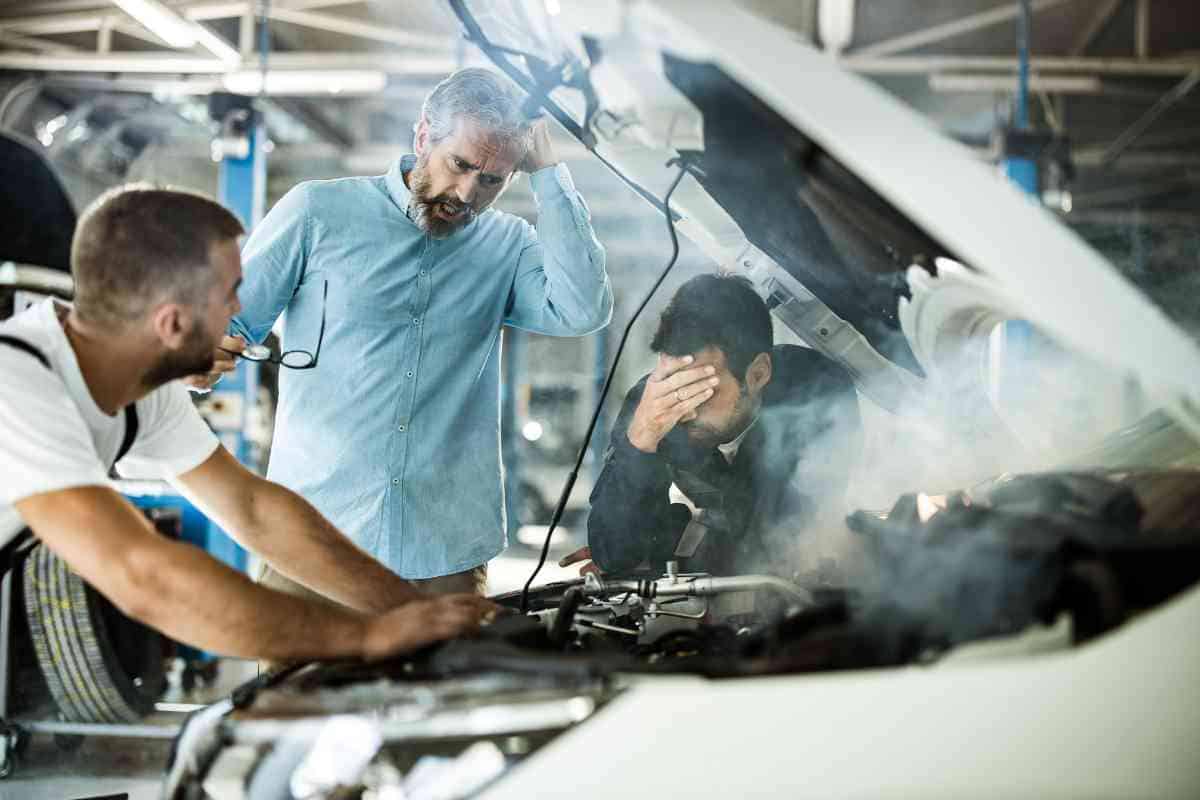
Safety Precautions
Monitoring the temperature gauge is vital. If it hits the red or you notice steam, it’s critical to act quickly.
- Pull Over: Safely pull over and shut off your engine to let it cool, preventing further damage.
- Wait: Allow the engine to cool before attempting to open the hood. Opening a hot radiator cap can result in burns from steam and coolant.
Temporary Measures on the Road
In the absence of immediate professional help, these temporary solutions can aid in safely reaching a service station.
- Check Coolant Levels: After the engine cools, assess the coolant level in the reservoir, topping up if necessary, but cautiously to avoid thermal shock.
- Run the Heater: Activating the heater draws heat from the engine, potentially lowering its temperature.
Remember, these are interim fixes; a mechanic should examine your car as soon as possible to diagnose and repair the root cause of overheating.
Long-Term Solutions
Persistent overheating can indicate deeper issues, necessitating preventive actions for your vehicle’s health and longevity.
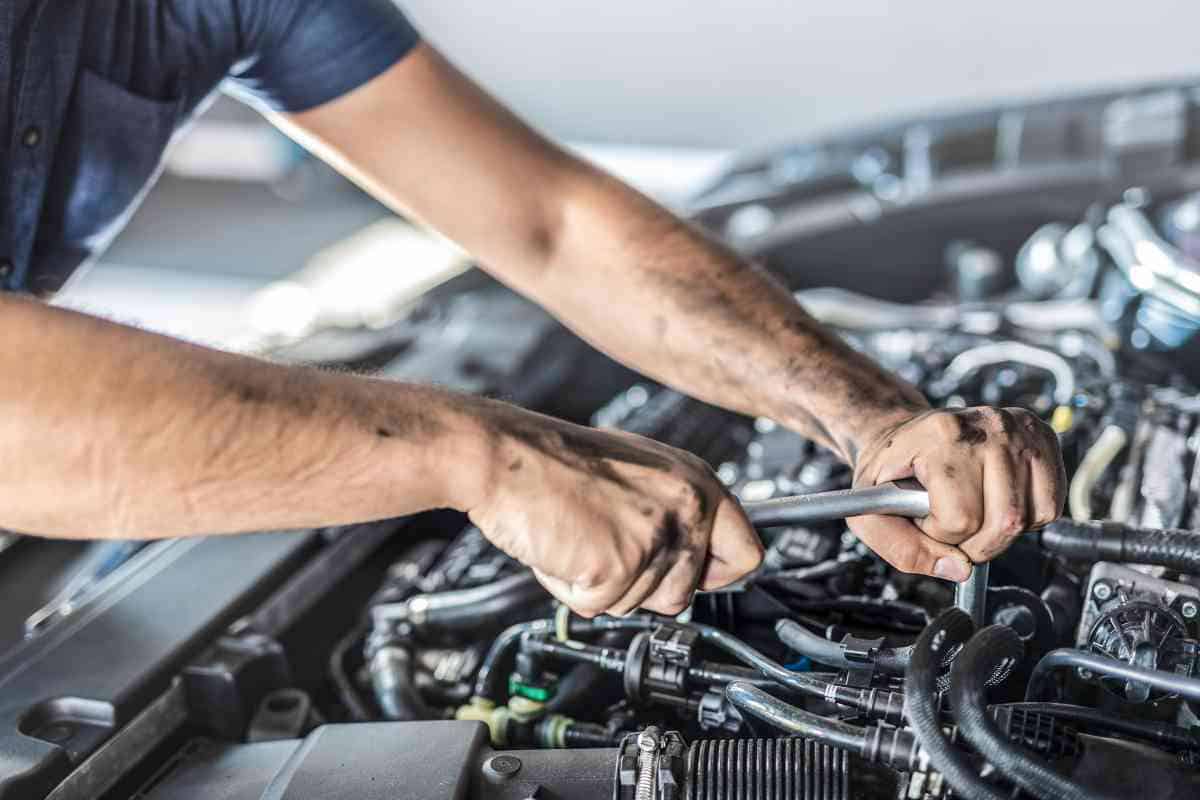
Regular Maintenance
- Coolant Levels and Quality: Regular checks and changes are crucial. Coolant should be flushed and replaced according to your vehicle’s guidelines.
- Hoses and Belts: Inspect these for signs of wear or damage, adhering to replacement schedules or addressing issues promptly to avoid overheating.
Related Post! Can Your Car Overheat Because Of Too Much Coolant?
Professional Inspection
- Diagnostic Check-Up: A thorough examination by a mechanic can uncover hidden problems, ensuring all components function correctly.
- Expert Recommendations: Heed professional advice tailored to your car’s specifications to avert overheating scenarios.
System Upgrades
- Cooling System Upgrade: For older or high-performance vehicles, enhancing the radiator or cooling system can offer improved efficiency and prevent overheating.
- Performance Parts: High-quality aftermarket components like a performance water pump or a high-flow radiator can elevate cooling capacity.
Adhering to these strategies not only helps tackle immediate overheating problems but also guards against future incidents, safeguarding your vehicle’s performance and extending its lifespan.
Related Post! The Last Car Maintenance Checklist You’ll Ever Need
Preventive Strategies
Maintaining your car to avoid overheating is essential, and it demands awareness of various factors, including weather conditions and driving behaviors. Being proactive is key to keeping your vehicle running smoothly and steering clear of the troubles caused by an overheated engine.
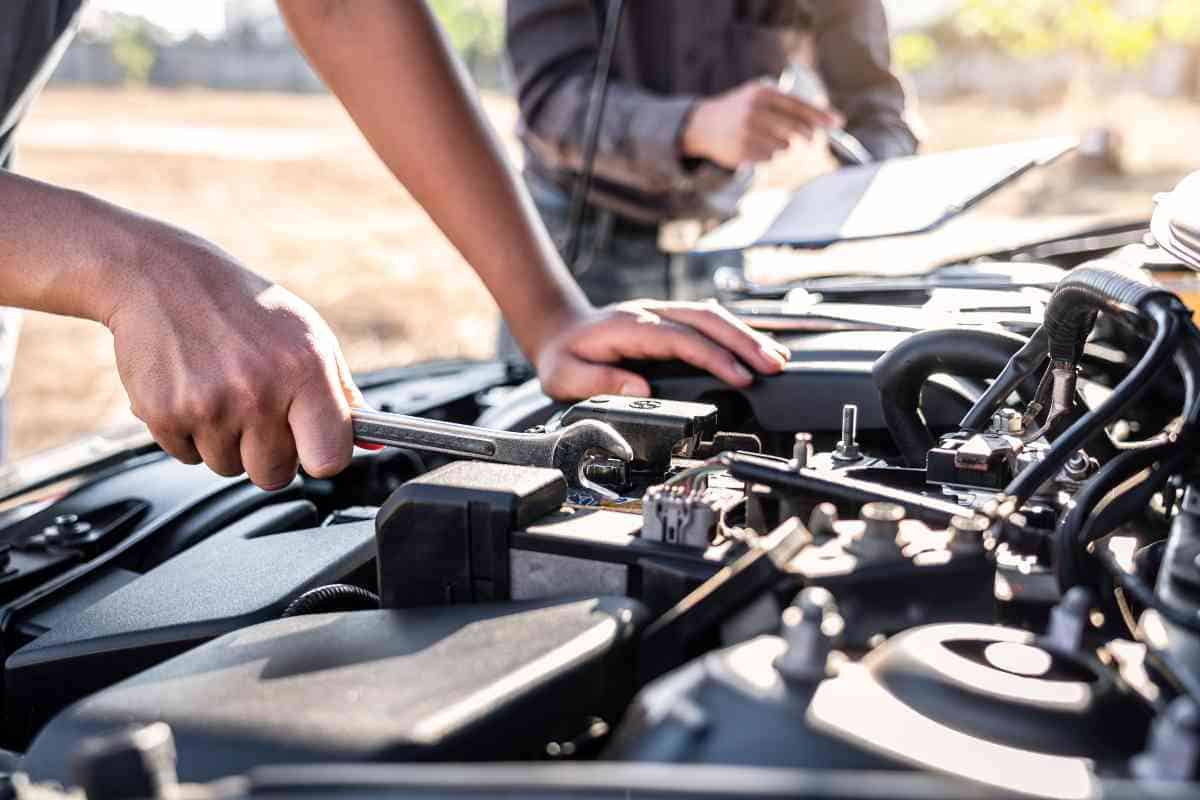
Overheating in Different Weather Conditions
Weather significantly affects your car’s operating temperature. In hot climates, ensuring your cooling system is optimal is crucial. Regularly check and top up coolant levels, and inspect the radiator and hoses for wear or damage. Utilizing coolant with a higher boiling point can offer additional protection during intense heat.
Conversely, cold weather poses its own risks for overheating. The thickening of oil in lower temperatures can increase engine strain. Using the correct winter-grade oil and ensuring the thermostat functions correctly are vital steps to prevent overheating in the cold.
Driving Habits to Mitigate Overheating Risks
Your driving style influences your car’s temperature. Smooth accelerations and avoiding aggressive driving can lessen engine exertion, helping to maintain a cooler operating temperature. Keeping an eye on the temperature gauge and allowing the car to cool when necessary are practical precautions.
Maintaining steady speeds, particularly on long drives, aids in preventing engine overheating. The consistency helps in reducing the demand on the engine, contrasting with the strain caused by frequent stops and starts.
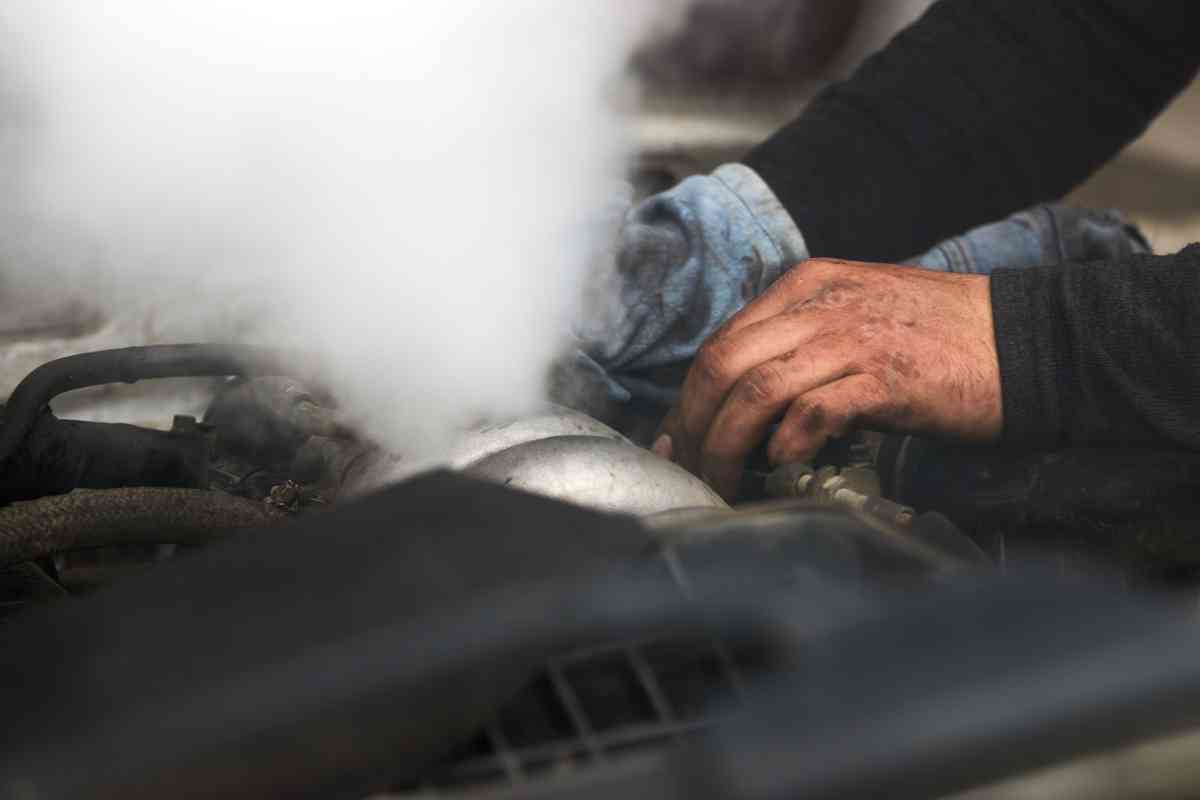
Troubleshooting Common Overheating Issues
Several usual suspects can lead to car overheating. Promptly addressing these can avert further vehicle damage:
- Thermostat Failures: A thermostat stuck in the closed position impedes coolant flow, causing temperatures to rise. Checking and potentially replacing the thermostat can often rectify overheating issues.
- Coolant Issues: Frequent coolant top-offs might indicate leaks that need to be identified and fixed to prevent engine overheating.
- Radiator Malfunctions: Effective heat dissipation relies on a fully functional radiator. Blockages, leaks, or external damage require immediate attention.
- Water Pump Damage: Signs of water pump failure, such as whining noises or coolant leaks, necessitate a quick replacement to avoid overheating.
Essential Tools and Resources for Overheating Issues
Being well-equipped and informed enhances your readiness to tackle overheating problems:
- Basic Toolkit: Includes spare coolant, distilled water for dilution, and a radiator pressure tester.
- Monitoring Tools: A thermometer for coolant temperature and a diagnostic scanner for modern vehicles.
- Reference Materials: Your car’s owner’s manual and repair guides, alongside online forums and communities, provide valuable troubleshooting advice.
- Emergency Contacts: Having your local mechanic’s number and roadside assistance on hand ensures help is available when DIY solutions fall short.
Understanding the causes of overheating and knowing how to address them effectively can save you from expensive repairs. With the right preparation and knowledge, you can manage most overheating scenarios confidently.
